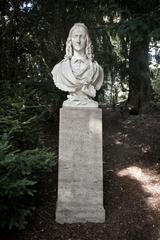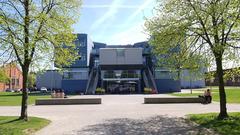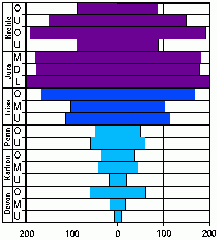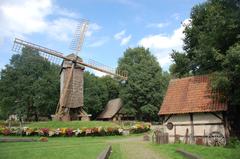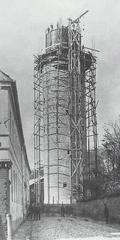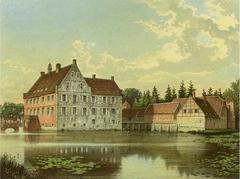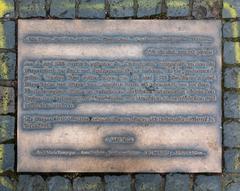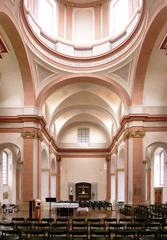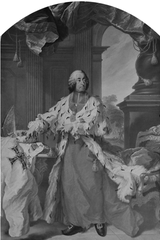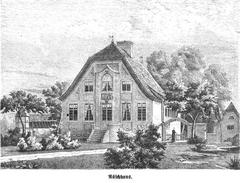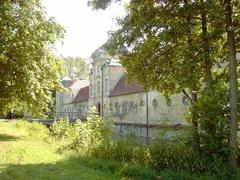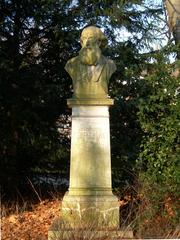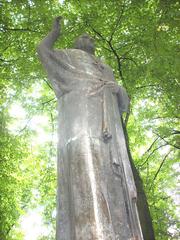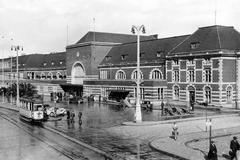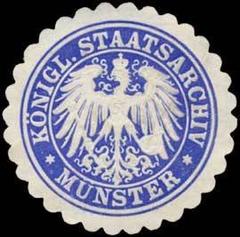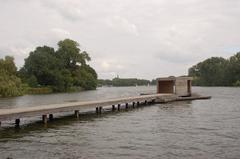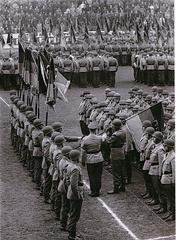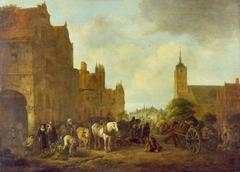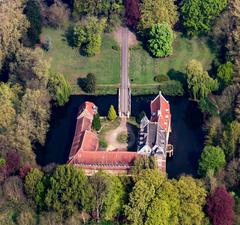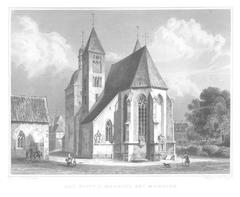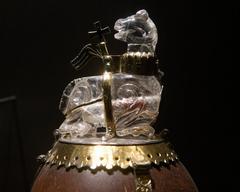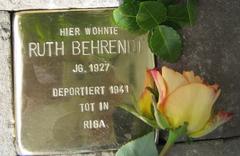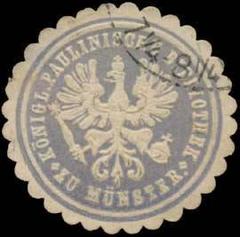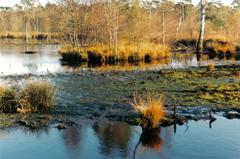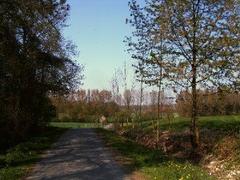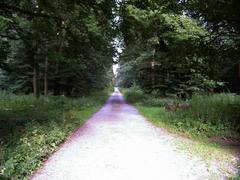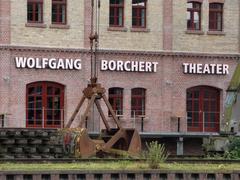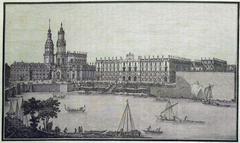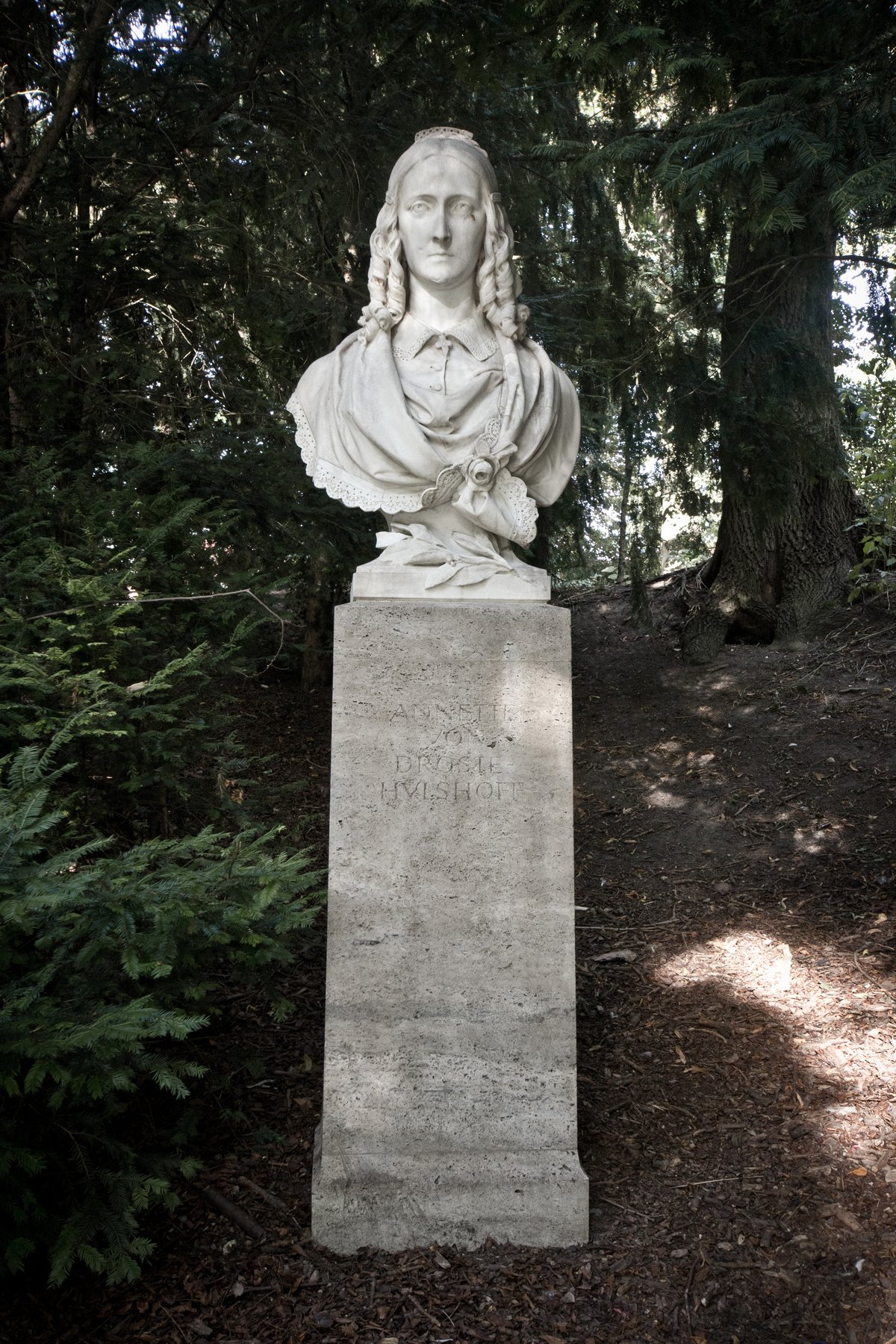
Annette von Droste-Hülshoff Marble Bust: Visiting Hours, Tickets, and Münster Heritage Guide
Date: 14/06/2025
Introduction
The Annette von Droste-Hülshoff marble bust in Münster stands as a distinguished tribute to one of Germany’s most celebrated 19th-century poets. Annette von Droste-Hülshoff (1797–1848) left a profound mark on German literature, capturing the cultural and natural essence of Westphalia through her poetry and prose. Visitors to Münster and the surrounding Münsterland region can engage deeply with her legacy by exploring the marble bust—found both at her birthplace, Burg Hülshoff, and as a public monument in Münster’s city center. This guide provides comprehensive information on visiting hours, ticketing, accessibility, and travel tips, while highlighting the cultural significance of the bust and related heritage sites such as Haus Rüschhaus and the Lyrikweg literary trail.
For official updates and resources, refer to the Burg Hülshoff official website, Münsterland Tourism, and the Droste Portal.
Table of Contents
- Introduction
- Annette von Droste-Hülshoff: Life and Literary Legacy
- The Marble Bust: Artistic and Historical Context
- Visiting the Bust in Münster: Locations & Practical Information
- Accessibility & Visitor Facilities
- Guided Tours, Events, and the Lyrikweg
- Cultural and Educational Significance
- Frequently Asked Questions (FAQ)
- Further Resources & References
Annette von Droste-Hülshoff: Life and Literary Legacy
Annette von Droste-Hülshoff, born at Burg Hülshoff near Münster, was a pioneering lyric poet and novelist whose works reflect the landscapes and social dynamics of 19th-century Westphalia. Despite health challenges, she created enduring literary works such as “Die Judenbuche” and influential poetry collections. Her writings explore themes of nature, introspection, and societal constraints, especially as experienced by women of her era. Droste-Hülshoff remains a central figure in German and European literary heritage, and her connection to the Münsterland region enriches the cultural identity of the area (Droste-Portal; Deutsche Biographie).
The Marble Bust: Artistic and Historical Context
Münster City Center Monument
Crafted by Anton Rüller in 1896 and reinstalled at its current location in 1905, the marble bust of Annette von Droste-Hülshoff in Münster is a prominent example of late 19th-century commemorative sculpture. Located at Kreuzschanze along the Innenstadtring, the bust stands on a travertine pedestal and is a focal point in the city’s green promenade. Its contemplative expression and neoclassical style symbolize Droste-Hülshoff’s literary significance and the recognition of women’s intellectual achievements (Skulpturen Kulturraum NRW).
Burg Hülshoff Site
Within the tranquil park of Burg Hülshoff, visitors can also find a marble bust honoring the poet at her birthplace. The castle, preserved as a museum and cultural center, offers deeper insights into Droste-Hülshoff’s life, family, and era. The museum’s exhibits include manuscripts, furnishings, and personal artifacts, all contextualizing the bust within the broader narrative of her life (Burg Hülshoff History; Stadt Münster).
Visiting the Bust in Münster: Locations & Practical Information
Münster City Center Monument
- Location: Kreuzschanze, Innenstadtring, Münster, NRW (approx. 51.967365, 7.622251)
- Accessibility: The monument is outdoors in a public park, accessible year-round and free of charge, with no ticket requirements or set visiting hours.
- Getting There: Easily reachable by foot, bicycle, car, or bus from Münster Hauptbahnhof and city center. The area offers flat, paved surfaces suitable for strollers and wheelchairs. Parking is available in nearby garages and P+R lots (Entdecke Dein NRW; K3 Stadterlebnisse).
Burg Hülshoff Site
- Address: Burg Hülshoff, Schonebeck 6, 48329 Havixbeck, near Münster
- Hours: Museum open Tuesday–Sunday, 10:00–17:00; grounds accessible during daylight hours year-round. Closed Mondays and select holidays.
- Tickets: Park and bust are included with museum admission. As of 2025:
- Adults: €7
- Reduced: €4.50
- Children under 18: Free
- Groups and combination tickets available (NRW Tourismus; Burg Hülshoff)
- Getting There: Accessible by car (on-site parking), regional buses from Münster, and cycling routes (Münsterland Tourism).
Accessibility & Visitor Facilities
Both the city center monument and Burg Hülshoff site are designed with accessibility in mind. Walkways are generally flat and paved, with benches and rest areas available. Wheelchair users will find accessible paths and facilities at Burg Hülshoff, including restrooms. Audio guides and video guides (including German Sign Language) are available at the museum. The Lyrikweg literary trail is “barrier-arm” and features accessible entry points (Münsterland Tourism).
On-site at Burg Hülshoff, visitors will find:
- Café and restaurant
- Gift shop with literary souvenirs
- Picnic areas and rest zones
Guided Tours, Events, and the Lyrikweg
- Guided Tours: Regular tours at Burg Hülshoff (German/English) explore the castle, museum, and Droste-Hülshoff’s life. Group bookings are recommended for English tours.
- Lyrikweg Trail: The nearly 7-km Lyrikweg links Burg Hülshoff and Haus Rüschhaus, featuring interpretive panels, audio guides, and digital content. Open year-round, free of charge (Lyrikweg).
- Special Events: Literary festivals, readings, and concerts are held throughout the year at Burg Hülshoff and related sites. Check the Center for Literature for current events and tickets.
- Nearby Heritage Sites:
- Haus Rüschhaus: Baroque estate and former home of Droste-Hülshoff, museum and garden tours available (Haus Rüschhaus).
- Erbdrostenhof: Historic city palace hosting literary events (Droste-Gesellschaft).
Cultural and Educational Significance
The marble bust of Annette von Droste-Hülshoff serves as a symbol of female literary achievement and regional identity. It is included in school programs, guided tours, and featured during cultural events, reinforcing Münsterland’s commitment to preserving its literary heritage. The site’s integration into green urban spaces and historic landscapes invites visitors to connect poetry, history, and nature (Droste-Portal; Münsterland Tourism).
Frequently Asked Questions (FAQ)
Q: Is there an entry fee to visit the Annette von Droste-Hülshoff marble bust in Münster city center?
A: No, the city center monument is free and accessible year-round.
Q: What are the opening hours for Burg Hülshoff and the museum?
A: Tuesday–Sunday, 10:00–17:00. The park is open during daylight hours.
Q: Are guided tours available in English?
A: Yes, English tours can be booked in advance at Burg Hülshoff.
Q: Is the site accessible for visitors with disabilities?
A: Yes, with paved paths, accessible restrooms, and audiovisual guides.
Q: Can I visit Haus Rüschhaus and Burg Hülshoff in one day?
A: Yes, the sites are connected by the Lyrikweg trail and are easily reached by bike, car, or bus.
Further Resources & References
- Burg Hülshoff Official Website
- Münsterland Tourism
- Droste Portal
- Skulpturen Kulturraum NRW
- K3 Stadterlebnisse
- Lyrikweg
- Droste-Gesellschaft
- Stadt Münster
- Droste Pad
- Deutsche Biographie
- De Gruyter Brill
Visitor Tips
- Visit early mornings or late afternoons for the best lighting and fewer crowds.
- Combine your visit with Münster’s other literary sites and museums for a full cultural experience.
- Check official websites for current ticket prices, special events, and accessibility updates.
- Download digital resources such as the Droste Pad or Audiala app for enhanced audio guides and interactive content.
